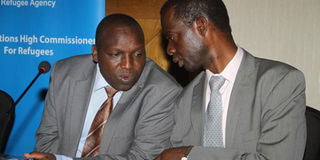Humanitarian agencies operating in Dadaab risk losing police escort over terrorism stand

Mr Haron Komen (left) Acting Commissioner of Refugee Affairs with Mr Wella Kouyou, Deputy Representative (United Nations High Commissioner of Refugee) on June 11, 2015 during a preparatory meeting for the World Refugee Day to be marked next week on Friday. PHOTO | CORRESPONDENT | NATION MEDIA GROUP
What you need to know:
The organisations which included UN agencies involved in humanitarian services as well as other refugee agencies had gathered in Nairobi for a preparatory meeting for the World Refugee Day due next week on Friday.
Although refugees are first vetted by the Kenyan government before being handed over to humanitarian agencies, Mr Komen argued they register asylum seekers only based on the information they provide to authorities.
This is the second time in six months that WFP has reduced food rations to the more than 550, 000 refugees living Kenya. WFP says refugees will now get two thirds of what they have been receiving.
The government has threatened to refuse police escort to humanitarian agencies working at Dadaab if they continue insisting refugees are not harbouring terrorists.
In what appeared to be a renewed clash over the fate of the camp, Acting Commissioner of Refugee Affairs Haron Komen argued relief organisations contesting the branding of Dadaab as a terrorist hideout are not realistic.
“If you continue insisting that refugees are innocent and are law abiding, we will not grant you security, you will just access it and you will know for yourselves what it means.”
“If you think refugees are not involved in criminal activities, can you venture in the camps without police escort? Why do you require police escort all the time to go to the camps?” he told an audience of humanitarian workers at the Intercontinental Hotel in Nairobi.
The organisations which included UN agencies involved in humanitarian services as well as other refugee agencies had gathered in Nairobi for a preparatory meeting for the World Refugee Day due next week on Friday.
The UN Refugee Agency (UNHCR) had argued during the forum that the Refugee Day will be used to remind host countries of their obligation.
LEGAL OBLIGATIONS
“Refugees are not criminals. They are just people like me and you. This year, our theme is ‘know a refugee’ and we would like also to remind governments that they have legal obligations to protect refugees,” said Mr Wella Kouyou, UNHCR Deputy Representative in Kenya.
But the meeting turned to the age-old debate on how soon Dadaab Refugee camp should be closed.
The camp which hosts about 335,000 Somali refugees has been at the centre of talks between the Kenya, UN Refugee agency (UNHCR) and Somali government.
Kenya has argued that terrorists and their sympathisers have been hosted by refugees before planning attacks on Kenyan soil. Two months ago, it ordered it be closed in 90 days before rescinding the decision after lobbying from aid agencies.
Although refugees are first vetted by the Kenyan government before being handed over to humanitarian agencies, Mr Komen argued they register asylum seekers only based on the information they provide to authorities.
“We register refugees based on the information they give us. They may not necessarily be telling the truth. Many of them may be protagonists in their wars back home.
“We are not saying all refugees are criminals, many of them are victims of crime, but some of them assist criminals by harbouring them,” he said.
REDUCE FOOD RATIONS
The debate raged even as the World Food Programme announced it will reduce food rations given to refugees in Kenya from next week.
Ms Challis Macdonough, a Senior Regional Spokesperson at WFP told reporters in Nairobi that the decision was reached because of funding cuts from donors.
“We have been facing enormous funding shortages. We find our programmes are entirely funded by donors. We are working with our donors to see if we can improve the situation,” she said in Nairobi.
This is the second time in six months that WFP has reduced food rations to the more than 550, 000 refugees living Kenya. WFP says refugees will now get two thirds of what they have been receiving.
However, this does not affect special feeds like nutritional supply for babies.
WFP says it requires at least $9.6 million per month to feed all the refugees who consume 9,300 metric tons of food monthly. It is seeking to raise $39.4 million more from donors to see its programmes through to January 2016.



